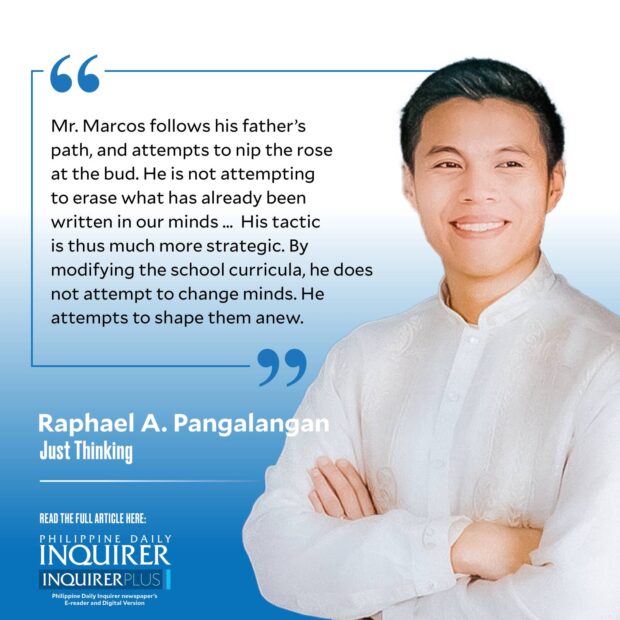DepEd: ‘Diktadurang _____’?
We’ve heard “Never Again!” so often; it almost sounds like a joke. Something read, but not respected. Heard, but never heeded.
“Do you remember the 21st night of September?” Earth, Wind, and Fire hits different for us Filipinos. That opening line stands responsible for turning many-a-night out into a chance for a history lesson. Amidst neon lights and blazing music, at the top of our lungs we would tell our story: This day, 51 years ago, Ferdinand Marcos Sr. issued Proclamation No. 1081 placing the Philippines under a state of martial law. For decades under Marcos’ authoritarian rule, the nation faced its darkest chapter in history. Both in numbers and in agony. Not only in scale, but in severity.
Article continues after this advertisementUnder Marcos’ rule, tens of thousands of Filipinos were stripped of their fundamental rights as violence was used as a medium to enforce civil control. As of 1977, about 70,000 Filipinos were political detainees. A reported 34,000 were victims of torture that included an array of methods such as confinement, isolation, rape, and molestation. About 3,240 were victims of extrajudicial killings.
It was not until the people’s uprising in 1986 (the People Power Revolution) that the dictator was forced out of office and into exile. Determined to prevent a repeat of the Marcosian past, the Philippines adopted a new constitution with elaborate checks-and-balances, among them, a president elected directly by the people.
Fast-forward half-a century later, the paradoxes of democracy and ironies of history met. On the 50th anniversary of the proclamation of Martial Law, that very provision enshrined in the 1987 Constitution would be used to elect the dictator’s son into office. The power of the people may have been the death of Marcosian rule in 1986. Today, it is its resurrection.
Article continues after this advertisementIt’s all too easy to label the election of President Marcos (and even, before him, Rodrigo Roa Duterte) as democratic backsliding. It’s a term I often hear used all-too-loosely, as if to say that their election as president was not the product of democratic processes. But that simply isn’t true. The election was held. The votes were cast. The choice was made, with eyes wide open. Indeed, perhaps it is that, above all else, that makes their election so worrisome.
We cannot call it democracy only when the system works the way we want it to. We cannot just demonize. We must analyze! We must ask the essential question: What has brought us here?
It did not happen overnight. Societal memory—it faded over time. If people think that the Marcos restoration came with the election of Mr. Marcos in 2022, they are gravely mistaken. While the death of democracy comes by a thousand cuts, the death of the Marcosian memory comes by a thousand compromises. With the return of the Marcoses from exile in the early 90’s. With Imee Marcos’ Kabataang Barangay (regarded as the Philippine equivalent of the “Hitler Youth”) being permitted to hold a reunion in the University of the Philippines Diliman—the erstwhile shining citadel of the Kabataang Makabayan—with no less than the support of Danilo Concepcion, then UP President and himself the former president of a Kabataang Barangay chapter during the Marcos dictatorship. Like with the whiff of the butterfly wing, little compromises tend to cascade. But for the Marcoses, it was from the ground up. From the local government, through the houses of Congress, and, ultimately the presidency.
Today, the new compromise comes in the shape of a Department of Education (DepEd) memorandum. The DepEd’s Bureau of Curriculum Development has ordered a change in the grade school curriculum to refer to the martial law years not as the “Diktadurang Marcos” (Marcos dictatorship) but just “Diktadura” (Dictatorship)—as if this dark chapter was simply a faceless phenomenon, untethered to the Marcos family’s power lust.
The DepEd memo comes straight out of the Marcosian playbook. Marcos Sr. knew all too well of the role the youth played in his legacy. Thus, he created the Kabataang Barangay to indoctrinate the youth in his New Society. Mr. Marcos follows his father’s path, and attempts to nip the rose at the bud. He is not attempting to erase what has already been written in our minds. No. He knows that if he hasn’t convinced us yet, he will not convince us now. His tactic is thus much more strategic. By modifying the school curricula, he does not attempt to change minds. He attempts to shape them anew. The Marcosian restoration does not look to cutting down deep-seated memories. No. They are planting seeds.
“Do you remember the 21st night of September?” Amidst the bright lights and blasting music, it’s hard to tell our story. Sometimes it feels as if our cries are merely mouthed and muted by the heavy beats that dominate.
But there’s a narrative louder than words. A story neither spoken in decibels nor spelled in ink, but shared through a felt hope and the unyielding pulse of determination.
Try as they may, we will not be silenced. The memory of the Marcos dictatorship will not be erased.
—————-
thinkjustly@gmail.com

















